VOLUME OF A TRAPEZOIDAL PRISM
Subscribe to our ▶️ YouTube channel 🔴 for the latest videos, updates, and tips.
Prisms are named for the polygons that form their bases. In this lesson, you will focus on prisms whose bases are either triangles or quadrilaterals other than squares and rectangles.
Formula for volume of a trapezoidal prism is
= Base Area x Height
Example 1 :
Find volume of the prism shown below.
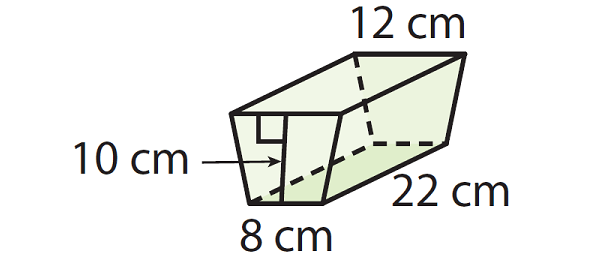
Solution :
Step 1 :
In the given prism, the two side walls are trapezoids. If we consider one of the trapezoid side walls as base, the height of the prism would be 22 cm.
So, the given prism is a trapezoidal prism.
Step 2 :
Volume of the given prism is
= base area x height
or
V = B x h
Step 3 :
Find base area.
Area of trapezoid with bases of lengths b1 and b2 and height h.
Base area (B) = (1/2) x (b1 + b2)h
= (1/2) x (12 + 8)10
= 100 sq.cm
Step 4 :
Find volume of the prism.
V = B x h
= 100 x 22
= 2200 cubic cm
The volume of the given prism is 2200 cubic cm.
Example 2 :
Cherise is setting up her tent. Her tent is in the shape of a trapezoidal prism shown below. How many cubic feet of space are in her tent ?
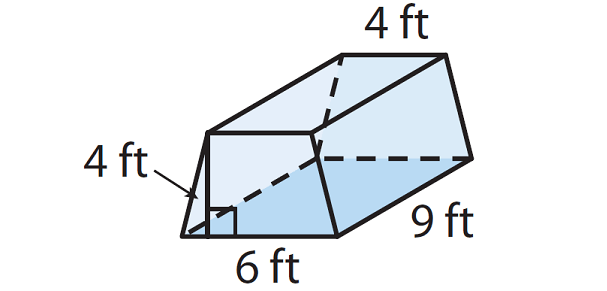
Solution :
Step 1 :
To find the number of cubic feet of space in the tent, we have to find the volume of Cherise's tent.
Step 2 :
Volume of Cherise's tent (Trapezoidal prism) is
= base area x height
or
V = B x h
Step 3 :
Find base area.
Area of trapezoid with bases of lengths b1 and b2 and height h.
Base area (B) = (1/2) x (b1 + b2)h
= (1/2) x (6 + 4)4
= 20 sq.ft
Step 4 :
Find volume of the prism.
V = B x h
= 20 x 9
= 180 cubic.ft
So, the number of cubic feet of space in Cherise's tent is 180.
Example 3 :
The shape of the box for a chocolate treat is a hexagonal prism, as shown below. Each box has a volume of 227 cm3. For Christmas, the company will switch to a festive box in the form of a hexagon-based pyramid. This festive box, which is intended to be stood upright and portray a Christmas tree, will have the same base and height as the standard prism packaging.
a) Determine the volume of the festive box. Round your answer to two decimal places.
b) If the treat usually costs $6.99, what would be a reasonable price for the festive version?
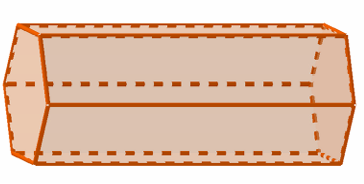
Solution :
a)
Volume of festive box = (1/3) x base area x height
= 1/3 x 227
= 75.66
So, volume of festive box is 75.66 cm3
b) The standard box costs $6.99. A reasonable price for the festive box should be proportional to its volume, so the cost of the festive box would be one-third of the standard price.
Price of festive box = 1/3 x 6.99
= $2.33
Given that the festive box contains one-third the amount of product, a reasonable price would be $2.33.
Example 4 :
Nautical deck prisms were used as a safe way to illuminate decks on ships. The deck prism shown here is composed of the following three solids: a regular hexagonal prism with an edge length of 3.5 inches and a height of 1.5 inches, a regular hexagonal prism with an edge length of 3.25 inches and a height of 0.25 inch, and a regular hexagonal pyramid with an edge length of 3 inches and a height of 3 inches. Find the volume of the deck prism.
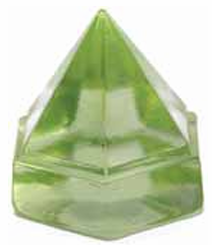
Solution :
Volume of first regular hexagonal prism = base area x height
base area of hexagonal = (1/2) x perimeter x apothem
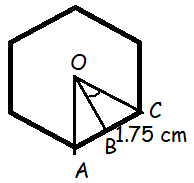
Finding apothem :
tan 30 = BC/OB
1/√3 = 1.75/OB
OB = 1.75√3
= (1/2) x 6(3.5) x 1.75√3
= 3 x 3.5 x 1.75 x 1.732
= 31.825
Height of the prism = 1.5 inches
Volume = 31.825 x 1.5
= 47.73 cubic inches
Volume of other hexagonal prism :
tan 30 = BC/OB
Half of side length = 3.25/2
= 1.625
1/√3 = 1.625/OB
OB = 1.625√3
= (1/2) x 6(3.25) x 1.625√3
= 3 x 3.25 x 1.625 x 1.732
= 27.44
Height of the prism = 0.25 inches
Volume of prism = 27.44 x 0.25
= 6.86 cubic inches
Volume of hexagonal pyramid :
tan 30 = BC/OB
1/√3 = 1.5/OB
OB = 1.5√3
= (1/2) x 6(3) x 1.5√3
= 3 x 3 x 1.5 x 1.732
= 23.38
Height of the prism = 3 inches
Volume = (1/3) x 23.38 x 3
= 23.38 cubic inches
Total volume = 47.73 + 6.86 + 23.38
= 77.97 cubic inches
So, the required volume is approximately 78 cubic inches.
Example 5 :
In the diagram below, the pyramid has a volume of 12.5 m3. Determine the volume of the prism (both solids have the same base and height).
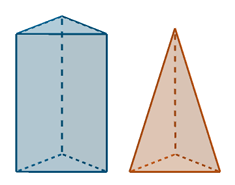
Solution :
Volume of prism = base area x height
Volume of pyramid = (1/3) x base area x height
Here both pyramid and prism has same base. So, base area will be the same.
12.5 = (1/3) x base area x height
base area x height = 12.5(3)
= 37.5 m3
So, volume of prism is 37.5 m3.
Subscribe to our ▶️ YouTube channel 🔴 for the latest videos, updates, and tips.
Kindly mail your feedback to v4formath@gmail.com
We always appreciate your feedback.
About Us | Contact Us | Privacy Policy
©All rights reserved. onlinemath4all.com

Recent Articles
-
US Common Core K-12 Curriculum Algebra Solving Systems of Equations
Dec 31, 25 09:15 PM
US Common Core K-12 Curriculum - Algebra : Solving Systems of Linear Equations -
Solving the HARDEST SAT Math Questions ONLY using Desmos
Dec 31, 25 05:53 AM
Solving the HARDEST SAT Math Questions ONLY using Desmos -
Times Table Shortcuts
Dec 30, 25 07:14 PM
Times Table Shortcuts - Concept - Examples
